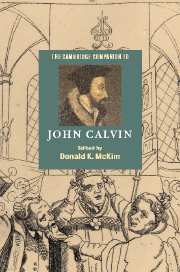Book contents
- Frontmatter
- Part I Calvin’s Life and Context
- Part II Calvin’s Work
- 3 Calvin’s writings
- 4 Calvin as a biblical interpreter
- 5 Calvin’s theology
- 6 Calvin’s ethics
- 7 Calvin’s preaching
- 8 Calvin on piety
- 9 Calvin and social-ethical issues
- 10 Calvin and political issues
- 11 Calvin’s controversies
- Part III After Calvin
- Part IV Calvin Today
- Select bibliography
- Index
4 - Calvin as a biblical interpreter
from Part II - Calvin’s Work
Published online by Cambridge University Press: 28 May 2006
- Frontmatter
- Part I Calvin’s Life and Context
- Part II Calvin’s Work
- 3 Calvin’s writings
- 4 Calvin as a biblical interpreter
- 5 Calvin’s theology
- 6 Calvin’s ethics
- 7 Calvin’s preaching
- 8 Calvin on piety
- 9 Calvin and social-ethical issues
- 10 Calvin and political issues
- 11 Calvin’s controversies
- Part III After Calvin
- Part IV Calvin Today
- Select bibliography
- Index
Summary
Well in advance of Calvin's entry into his vocation as a reformer of the church in Geneva and Strasbourg, the sixteenth century had already displayed a remarkable preoccupation with biblical interpretation and, as a consequence, an unprecedented eruption of exegetical publications. Factors contributing to this eruption are not difficult to identify, and Calvin's career and character as a biblical interpreter would recapitulate most of them.
To begin with, the medium of intellectual exchange was forever altered by the dissemination of the printing press throughout Europe. As the costs of printing fell, books ceased to be a luxury item. Coupled to the growth of printing was a rising tide of scholarship that both consumed and produced those books. The humanist cry: Ad fontes - “back to the sources” - fueled scholars' appetites for these same sources as they emerged from the presses. Scholarship itself, along with scholarly standards, kept pace. A mastery of Latin alone was no longer enough to make one a respectable scholar: Greek and Hebrew were also required, and the growing competence of sixteenth-century scholars nourished, in turn, keener critical skills. For example, if these burgeoning sources, editions, and tools reminded scholars and preachers that there were new discoveries to be made in their old Bibles, Erasmus' early textual criticism of the New Testament undermined the magisterium of the Latin Vulgate and warned his readers they could not take even the wording of the Bible for granted, much less its theological content.
- Type
- Chapter
- Information
- The Cambridge Companion to John Calvin , pp. 58 - 73Publisher: Cambridge University PressPrint publication year: 2004
- 12
- Cited by

